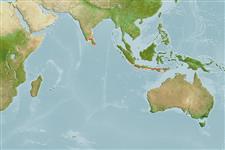>
Anguilliformes (Eels and morays) >
Muraenidae (Moray eels) > Muraeninae
Etymology: pelonates: Name from Greek 'pelos' for mud and 'nates' for dweller, refers to its mud-dwelling habit; noun in apposition.
More on authors: McCosker & Randall.
Environment: milieu / climate zone / depth range / distribution range
Ecologia
marinhas demersal; intervalo de profundidade 15 - 32 m (Ref. 75775). Tropical
Western Pacific: Indonesia.
Tamanho / Peso / Idade
Maturity: Lm ? range ? - ? cm
Max length : 46.5 cm TL macho/indeterminado; (Ref. 75775)
Descrição suscinta
Morfologia | Morfometria
Vértebras: 155. This species is small, elongate, slender, brown moray has white spots and vermiculations on the head behind the rictus and extends into the anterior trunk; pale margins posteriorly on fins; anus before midbody; length of preanal 2.5-2.6 in TL; gill opening depth 33-35 in TL; head 10-11 in TL; short snout, rear margin of orbit above middle or eye; jaws moderately long, not recurved; conical teeth, some needle-like; biserial maxillary teeth, those on outer row smaller and closely spaced; mostly uniserial mandibular teeth, outer row smaller and closely spaced; MVF 6/56/154 (Ref,. 75775).
Found on mud bottom with scattered rocks in 15-32 m (Ref. 90102).
Ciclo de vida ou comportamento de acasalamento
Maturidade | Reprodução | Desova | Ovos | Fecundidade | Larvas
McCosker, J.E. and J.E. Randall, 2007. A new genus and species of mud-dwelling moray eel (Anguilliformes: Muraenidae) from Indonesia. Proc. Calif. Acad. Sci. 58(22):469-476. (Ref. 75775)
Status na Lista Vermelha da UICN (Ref. 130435)
Ameaça para os humanos
Harmless
Uso pelos humanos
Mais informação
Nomes comunsSinônimosMetabolismoPredadoresEcotoxicologiaReproduçãoMaturidadeDesovaAgregação de desovaFecundidadeOvosDesenvolvimento dos ovos
Idade/TamanhoCrescimentoPeso-comprimentoComprimento-comprimentoFrequências de comprimentoMorfometriaMorfologiaLarvasDinâmica larvalRecrutamentoAbundânciaBRUVS
ReferênciasAquaculturaPerfil para aquaculturaEstirpesGenéticaElectrophoresesHereditariedadeDoençasProcessamentoNutrientsConversão de massa
ColaboradoresFotosStamps, Coins Misc.SonsCiguateraVelocidadeTipo de nataçãoÁrea branquialOtólitosCérebrosVisão
Ferramentas
Relatórios especiais
Baixar XML
Fontes da internet
Estimates based on models
Índice de diversidade filogenética (Ref.
82804): PD
50 = 1.0000 [Uniqueness, from 0.5 = low to 2.0 = high].
Bayesian length-weight: a=0.00050 (0.00025 - 0.00101), b=3.26 (3.10 - 3.42), in cm total length, based on LWR estimates for this (Sub)family-body shape (Ref.
93245).
Nível Trófico (Ref.
69278): 3.9 ±0.6 se; based on size and trophs of closest relatives
Resiliência (Ref.
120179): médio(a), tempo mínimo de duplicação da população 1,4 - 4,4 anos (Preliminary K or Fecundity.).
Fishing Vulnerability (Ref.
59153): Moderate vulnerability (37 of 100).
